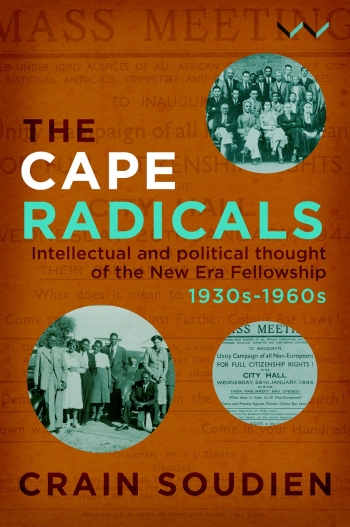Launch of 'The Cape Radicals': Remembering South Africa's early thinkers who saw through racial ideology
DATE: 24 July 2019
AUTHOR: Andrea Teagle
Deep in the heart of late 1930’s Cape Town, a theory of anti-racialism began to emerge from a group of young thinkers who called themselves the New Era Fellowship (NEF). At the recent launch of his new book The Cape Radicals: Intellectual and Political Thought of the New Era Fellowship, 1930s-1960s, the HSRC’s CEO Prof Crain Soudien traced the evolution of the group to its intellectual peak: the dismantling of race as a social construct. The book shines a light on the early seeds of resistance that the NEF’s teachings sowed across the country. Andrea Teagle reports.
In 1937, out of the meeting of a handful of young Capetonians was born a socialist debating group whose influence was to have far-reaching repercussions for South African non-racialist thought. Goolam Gool, a second-generation South African, Ben Kies, the son of a Cape Town factory worker and Isaac (“IB”) Tabata, a truck driver hailing from the Eastern Cape founded the New Era Fellowship (NEF) to respond to the dominant narrative of racial hierarchy.
Before even the beginning of apartheid, these young intellectuals, who “floated at the margins of the University of Cape Town”, made monumental strides in exposing the ideology of racist thought that disguised itself insidiously as objective truth.
On 13 July, Soudien, in conjunction with the Book Lounge, launched the book at the District Six Homecoming Centre in Cape Town. Speaking at the launch, Crain told of how members the NEF would meet to debate questions of race and being. For 13 years, Soudien said, the group’s focus evolved from a preoccupation with the question of coloured dignity to the pioneering idea of race itself as a construct.
“In this place, around the corner… begins to emerge the direct response [to the dominant racist ideology]… an anti-racial theory, here deep in the heart of Cape Town, twenty years in advance of scientific thinking [and] political thinking in the rest of the world.”
Importantly, as Soudien’s fellow speaker, the literary critic Shaun Viljoen pointed out, Kies, Tabata, Gool and the other NEF members lived their lives according to this non-racialist ideology, embodying the concept of the personal as political. Many taught in schools around the country to sow seeds of resistance to psychological oppression – a mantle that Steve Biko would later take up in the Black Consciousness Movement.
In 1951, Tabata delivered a lecture to the group titled “Landlessness is a means of exploitation,” with clear relevance for today’s land debates. In it, he clearly outlined the machinery of South Africa’s economic state.
“The real rulers of the country are the mine-owners and the big White farmers, in that order,” Tabata told his fellows. To run smoothly, the state required a steady supply of cheap labour, facilitated by a legislated process of “squeezing the African off the land and driving him into one or other of the two channels.”
“As long as the African had land to subsist on, he could not be driven, helpless, into the labour market,” Tabata concluded. Thus, the required equitable redistribution of land would imply “a radical re-adjustment of the whole political, economic and social set-up in this country.”
Then, in 1953, Kies delivered a seminal lecture to the NEM, exposing race as a myth and arguing that the concept of Western civilisation is a fallacy. “He talks about race in a way that you would not have heard anywhere else in the world,” Soudien said. “It was an absolutely critical theoretical moment.”
The NEM gradually disbanded, but the modes of thought that resisted the ideology of white supremacy were kept alive, through the political projects and ideas of its members. For example, the NEF’s sister organisation, the Non-European Unity Movement, continued sowing seeds of resistance through teachings across the country.
Tabata remained a prominent thinker and proponent for non-racialism – denying not the impacts of racism but rather the claimed scientific basis for racial hierarchies – and a united resistance front.


